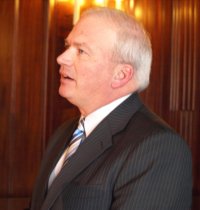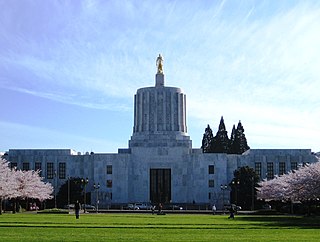
A quorum is the minimum number of members of a deliberative assembly necessary to conduct the business of that group. According to Robert's Rules of Order Newly Revised, the "requirement for a quorum is protection against totally unrepresentative action in the name of the body by an unduly small number of persons." In contrast, a plenum is a meeting of the full body or very close to it.

The Florida Legislature is the legislature of the U.S. State of Florida. It is organized as a bicameral body composed of an upper chamber, the Senate, and a lower chamber, the House of Representatives. Article III, Section 1 of the Florida Constitution, adopted in 1968, defines the role of the legislature and how it is to be constituted. The legislature is composed of 160 state legislators. The primary purpose of the legislature is to enact new laws and amend or repeal existing laws. It meets in the Florida State Capitol building in Tallahassee.

The Indiana General Assembly is the state legislature, or legislative branch, of the state of Indiana. It is a bicameral legislature that consists of a lower house, the Indiana House of Representatives, and an upper house, the Indiana Senate. The General Assembly meets annually at the Indiana Statehouse in Indianapolis.

The Florida House of Representatives is the lower house of the Florida Legislature, the state legislature of the U.S. state of Florida, the Florida Senate being the upper house. Article III, Section 1 of the Constitution of Florida, adopted in 1968, defines the role of the Legislature and how it is to be constituted. The House is composed of 120 members, each elected from a single-member district with a population of approximately 157,000 residents. Legislative districts are drawn on the basis of population figures, provided by the federal decennial census. Representatives' terms begin immediately, upon their election. As of 2019, Republicans hold the majority in the State House with 73 seats; Democrats are in the minority with 46 seats. One seat is vacant.

Mitchell Elias Daniels Jr. is an American academic administrator, businessman, author, and retired politician who served as the 49th Governor of Indiana, from 2005 to 2013, as a Republican. Since 2013, Daniels has been president of Purdue University.

The Wisconsin Legislature is the state legislature of the U.S. state of Wisconsin. The Legislature is a bicameral body composed of the upper house Wisconsin State Senate and the lower Wisconsin State Assembly, both of which have had Republican majorities since January 2011. With both houses combined, the legislature has 132 members representing an equal number of constituent districts. The Legislature convenes at the state capitol in Madison.

The 2003 Texas redistricting refers to a controversial mid-decade state plan that defined new Congressional districts. In the 2004 elections, this redistricting supported the Republicans taking a majority of Texas's House seats for the first time since Reconstruction. Opponents challenged the plan in three suits, combined when the case went to the United States Supreme Court in League of United Latin American Citizens v. Perry (2006).

The Florida Senate is the upper house of the Florida Legislature, the state legislature of the U.S. state of Florida, the Florida House of Representatives being the lower house. Article III, Section 1 of the Constitution of Florida, adopted in 1968, defines the role of the Legislature and how it is to be constituted. The Senate is composed of 40 members, each elected from a single-member district with a population of approximately 470,000 residents. Legislative districts are drawn on the basis of population figures, provided by the federal decennial census. Senators' terms begin immediately, upon their election. The Senate Chamber is located in the State Capitol building.

Brian C. Bosma is an American politician and lawyer who is the current Speaker of the Indiana House of Representatives. A member of the Republican Party, Bosma has served in the Indiana House since 1986. He replaced Gordon Harper. He was originally elected in the 50th district, but was redistricted to the 88th district in 1992. The 88th district encompasses northeast Marion County and portions of Hancock and Hamilton County.

The Oklahoma House of Representatives is the lower house of the legislature of the U.S. state of Oklahoma. Its members introduce and vote on bills and resolutions, provide legislative oversight for state agencies, and help to craft the state's budget. The upper house of the Oklahoma Legislature is the Oklahoma Senate.

David Lewis Williams is an American attorney, Republican politician, and a judge from the U.S. state of Kentucky. From the year 1987 to 2012, Williams represented Senate District 16, a position he secured upon the retirement of fellow Republican Doug Moseley. When Republicans gained control of the state senate in 2000, Williams was chosen as President of the Senate, and held that post continuously until his resignation in November 2012. In September 2010, he announced his candidacy for the Republican nomination for governor in the 2011 gubernatorial election. On May 17, 2011, Williams secured the Republican nomination over Tea Party movement-backed Phil Moffet. However, he lost the general election by twenty points to incumbent Democratic Governor Steve Beshear. In November 2012, Williams resigned his Senate seat to accept a circuit court judgeship.
B. Patrick Bauer is a Democratic member of the Indiana House of Representatives, representing the 6th House District since 1970. His district consists primarily of the city of South Bend in St. Joseph County in northern Indiana. On January 28, 2020, Bauer announced that he would not be running for reelection.
The Democratic Party of Indiana is the affiliate of the U.S. Democratic Party in the U.S. state of Indiana.

Scott L. Fitzgerald is an American politician and one-time newspaper publisher. He is a Republican member of the Wisconsin Senate, representing the 13th District since 1994.
Karen Rae Tallian is a Democratic member of the Indiana Senate, representing the 4th District, Portage, since her election in December 2005. She was re-elected in 2006, 2010 and 2014. While serving in the Senate, Tallian, a progressive, has supported medicinal prescription and the decriminalization of marijuana, and has authored bills in its favor. In 2015, she announced her candidacy for governor of Indiana but dropped out that same year, well before the primary season. On August 21, 2019, Tallian announced that she would be seeking the Democratic Party nomination for Indiana attorney general in 2020.

Fred Frank Girod is a Republican politician from the U.S. state of Oregon. He serves in the Oregon State Senate representing District 9, in the mid-Willamette Valley, and lives in Stayton.

Lois Court is a former legislator in the U.S. state of Colorado. Initially elected to the Colorado House of Representatives as a Democrat in 2008, Court represented House District 6 from 2009 through 2016, and was elected to the Colorado Senate in 2016. Court represented State Senate District 31, which encompasses portions of central and southeast Denver, Colorado. Court resigned from the senate on January 16, 2020 after being diagnosed with Guillain-Barré syndrome in early 2020. She served as the President Pro Tempore of the Colorado State Senate from January 2019 until her resignation from the senate in 2020.

In February 2011, a series of public employee protests began in the United States against proposed legislation which would weaken the power of labor unions. By March, eighteen states had proposed legislation which would remove some collective bargaining powers from unions, along with another five states which proposed legislation which would negatively affect unions. The protests occurred when public employee unions mounted protests against legislation proposed by Republican governors such as Scott Walker (Wisconsin), Rick Scott (Florida), Mitch Daniels (Indiana), Sean Parnell (Alaska), Rick Snyder (Michigan), John Kasich (Ohio), Paul LePage (Maine) and Jan Brewer (Arizona) which, among other things, would strip public employees of some collective bargaining rights as well as require higher employee contributions to pension and health care plans. The governors stated they needed these changes in order to cut state spending and balance the states' budgets. The protests began in Wisconsin, then spread to Indiana and Ohio, with unions around the country rallying to show their opposition to the proposed legislation. Several other states considered similar legislation. Virginia, North Carolina, and Texas prohibit formal collective bargaining with public employees.

The 80th Oregon Legislative Assembly is the current meeting of the Oregon Legislative Assembly. It began January 22, 2019.

A series of Oregon Republican State Senator walkouts began in May 2019 when Republican members of the Oregon State Senate refused to attend floor sessions of the Oregon Senate in an effort to stymie Democratic efforts to pass House Bill 3427. Proposed during the 80th Oregon Legislative Assembly, the bill would have provided $2 billion for K-12 schools through a new tax package. The senators eventually returned after reaching a deal with Oregon Senate Democrats and Oregon Governor Kate Brown, but elected to "vanish" the following month over another bill, House Bill 2020. House Bill 2020 is designed to institute a carbon tax in Oregon. Republican senators argue that it would unduly burden their constituents, while Democrats argue it is necessary to place Oregon at the forefront of the fight against climate change.

















